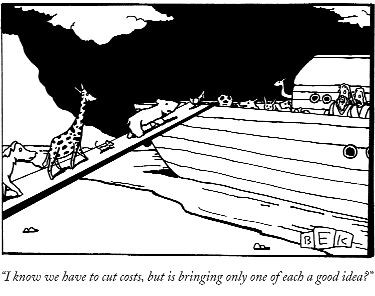Century Marks

Body talk: When Edwin Friedman faced quadruple bypass surgery, he wondered whether he had heretofore seen his body as a friend. Perhaps—but if so, he had abused this friend. “If my symptoms could talk, what would they say to me?” he wondered. He imagined his symptoms saying, “You take care of us and we’ll take care of you.” Friedman concluded that his recuperation had to begin before the surgery (What Are You Going to Do with Your Life? Seabury Books).
Big hearts: Philanthropy is usually measured by the size of the material resources given away. On that basis, Bill Gates and Warren Buffett are the greatest philanthropists of our time. But Richard B. Gunderman says material resources are not the sole or the most important route to human flourishing and concludes: “If intangible resources are more important than tangible ones, then generosity of spirit is more important than generosity of pocketbook” (We Make a Life by What We Give, Indiana University Press).
Learning from Moses: Moses has been an important figure for Americans since the time of the Pilgrims. Bruce Feiler thinks Moses can serve as a model in these times for President Obama. He must offer people “milk and honey”—that is, offer a story of hope, not just details about policy. He needs to work at building a society that nurtures everyone, even the strangers (immigrants) among us. From Moses, Obama can learn how to take the heat from his opponents, some of whom ask, as people asked of Moses, “Who made you leader over us?” Finally, Obama could learn that he may not see the promised land himself, so he must prepare his followers to succeed without him—the most trying lesson of leadership (Time, October 12).
Order in the court: With Sonia Sotomayor now on the Supreme Court, two thirds of the justices are Catholics—though Catholics make up only 24 percent of the population. Historically Episcopalians and Presby terians have been overrepresented on the high court: half of all justices have come from those two denominations, even though as of 2000 the two denominations comprised less than 5 percent of the American population. The Catholic justices haven’t necessarily backed Catholic teachings. While they’ve tended to support cases that restrict abortions, they’ve also tended to uphold the death penalty (David Gibson at Politics Daily).
Clean hands? The White House and federal health officials have released guidelines recommending that worshipers take precautions against spreading germs to reduce the risk of contracting swine flu. The guide suggests that houses of worship encourage congregants to wash their hands often, use hand sanitizer, avoid crowded situations and interact without physical contact when possible. The federal guidelines also are relevant to Islam. Some Muslims ritually cleanse themselves using the same bowl of water before they are called to prayer. And in the Jewish tradition, congregants close the service by shaking hands and wishing each other a good Sabbath, or “Shabbat shalom” (RNS).
How sweet it is: An old parking lot on the former site of Sears Roebuck in inner-city Chicago is an unlikely spot for a beehive. The Chicago Honey Co-op started with 40 beehives and is now up to 100. Next to the bee farm is a garden where residents raise food and flowers. The co-op offers employment to former convicts and teaches beekeeping several times a year. At the request of the mayor, it maintains eight beehives on public buildings in downtown Chicago (Orion, September/October, and chicagohoneycoop.com).
Stirring debate: Columnist Ellen Goodman cites her two favorite mo ments in the health-care debate. The first was when Senator Jon Kyl (R., Ariz.) argued against mandating that maternity benefits be part of basic insurance coverage, saying, “I don’t need maternity care”—to which Debbie Stabenow (D., Mich.) responded, “I think your mom probably did.” The other moment was when Senator Jim Bunning (R., Ky.) railed, “I do not support a government takeover of the health care system”—and then fell asleep (Washington Post Writers Group).
Expletives undeleted: John L. Jackson Jr., professor at the University of Pennsylvania, thinks there is a double standard on using profanity in higher education. Coaches regularly upbraid student athletes by letting loose a string of expletives, but faculty would be censured if they were to talk that way to students in the classroom. “For some reason, we think about the classroom as the wrong place for university employees to curse at their students,” he says. “What makes basketball courts or football fields more appropriate?” (Chronicle Review blog).
Conditional healing: Michael Moore’s film Capitalism: A Love Story includes a segment in which he satirically subverts some of Jesus’ teachings and turns them into profit- making slogans. In one scene Jesus refuses to heal a sick man because of the man’s “preexisting condition” (Beliefnet).
Praying for liberals: Liberty Counsel, a right-wing legal organization affiliated with Liberty University, has announced an “adopt a liberal” program. It exhorts people to pray for one of 11 liberals on a list that includes President Obama, Senate Majority Leader Harry Reid, Speaker of the House Nancy Pelosi and Secretary of State Hillary Clinton. The 11th is designated the “unknown liberal” so people can adopt their own liberal to pray for (Americans United press release).
Left behind: An atheistic group in the United Kingdom claims to be serious about its offer to provide care for pets left behind by Christians when they are taken by the rapture. For a small donation the group promises to make sure pets are fed and cared for (postrapturepetcare.com).
Recently seen bumper sticker: “I’m pretty sure God prefers spiritual fruits to religious nuts” (Beliefnet).





